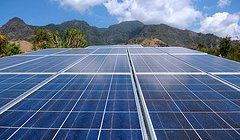China controls the clean tech market while other nations falter
With China as the forerunner in the global renewable energy industry, Europe and the US, without significantly scaling up investment, risk missing out on becoming key global players in the rapidly expanding clean tech market.

With China as the forerunner in the global renewable energy industry, Europe and the US, without significantly scaling up investment, risk missing out on becoming key global players in the rapidly expanding clean tech market.
China controls approximately 90 per cent of the world's mineral resources, which are essential to many new and emerging technologies. It also works on the technologies that exploit them, giving it unparalleled power.
According to a report from Ernst & Young published on 30th November 2010, in the second quarter of 2010, China committed US$10 billion of its stimulus funds to clean energy projects-figure that is on the upturn. This investment outweighs that from any other nation.
Despite the name rare materials are abundant, and although many are produced in other parts of the world, mining and processing operations have been forced to shut down. Foreign economies are finding the industry increasingly unprofitable, confronted with China's large and sustained investments combined with low production costs and low-cost labour.
China's largest clean tech sectors include agriculture, energy efficiency, energy generation, water and waste water management, energy storage and recycling and waste. In solar, Chinese companies are dominating where other nations are faltering.
One significant factor is that Chinese solar manufacturers are now increasingly selling products at home due to increased demand, eradicating concerns that there would be a global over supply.
The clean tech industry looks set to be a viable alternative to solving China's energy issues, moving it away from oil reliance and offering a promising view future for adapting to climate change.
The growth in China's renewable energy market reflects the success of the government's often complex program aimed to foster a domestic clean tech market and manufacturing base.
The actions respond positively to climate change promises made in Copenhagen, although issues with regard to international collaboration are still of concern. The 16th Conference of Parties (COP16) currently taking place in Cancun, aims to improve collaboration between nations so that an international treaty can be reached.
There are fears that tension between the US, Europe and China to dominate the clean tech sector could lead to widespread protectionism and spark a trade war. The prevalent fear in the industry is that it is close to becoming a monopoly, with the US and Europe falling behind.
According to the recent Ernst & Young report, the US is losing their position in the market due to "continued repercussions of the financial crisis, low gas prices, and the uncertain medium-to-long-term policy environment". In order to narrow the gap between nations' clean tech markets, suggestions are to continue extraction processes elsewhere, or to looks for alternative materials and technologies.
The discovery of new technology is promising, although the ability to profit from China's growth in this green industry need not be ignored. "China has opened up a healthy gap from other markets. Cleantech, including renewable energy, represents a significant part of the country's future economic growth plans," said Ben Warren, energy and environmental infrastructure advisory leader at Ernst & Young.
It is anticipated that negotiations in COP16, including complex relations with China, could be facilitated by cooperation, rather than conflict, in the clean tech field.
At the UN Climate Change Summit in 2009, US President Barrack Obama said: "By developing and disseminating clean technology and sharing our know-how, we can help developing nations leap-frog dirty energy technologies and reduce dangerous emissions."
Concerns of a potential trade war between the most powerful players in the fast-expanding clean tech industry were renewed in October when China halted shipments of rare overseas earth materials.
China's blocked shipments of materials to Japan, the US and Europe, followed a US investigation into the country's use of clean tech policies that allegedly breach World Trade Organization rules. The allegation was that China has been making unfair levels of subsidy available to domestic clean tech firms.
The US was labelled a hypocrite for investigating claims, given that it also offers substantial subsidies to its own clean tech industries. China's Ministry of Commerce dismissed the charges as "groundless and irresponsible". The controversy continues, with the tense US- China trade relationship persisting.
All nations anticipate progress in Cancun this week, with negotiations between the US and China seen as fundamental towards the climate change battle. Governments from Europe and the US will discuss their positions in the clean tech industry, with the recognition that without the right regulatory framework to significantly scale up investment, they could risk missing crucial low-carbon targets as well as losing a foot-hold in the clean tech industry.
Author: Marianna Keen | Climate Action
Image: Jeda Villa Bali/ Flickr


_-_frame_at_0m5s_400_250_80_s_c1.jpg)



